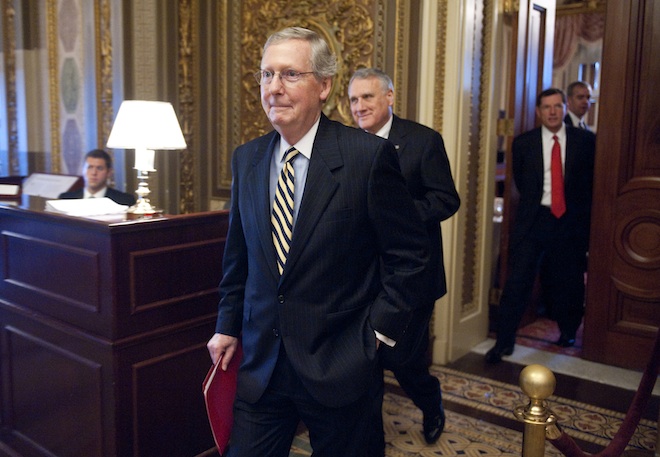Senate Democrats stand ready to pass legislation permanently empowering the President to raise the debt ceiling.
The bill is based on an idea Senate Minority Leader Mitch McConnell (R-KY) first introduced last year to avoid a debt-ceiling-driven economic disaster, and now the White House wants it incorporated into an end-of-year plan to avoid automatic, across-the-board tax increases and spending cuts this January.
Republicans, who hope to use the debt ceiling once again as leverage to force Democrats to accept deep cuts to domestic social programs, are unsurprisingly opposed to the idea. And they’re using their opposition to mislead the public about what the debt ceiling is, and the implications of vesting the power to raise it within the Executive Branch.
“By demanding the power to raise the debt limit whenever he wants by as much as he wants, [President Obama] showed what he’s really after is assuming unprecedented power to spend taxpayer dollars without any limit,” McConnell argued on the Senate floor.
This sounds awfully sinister. But it’s a knowing misreading of the Constitution, which provides Congress and only Congress the power to spend money.
The debt limit is a nearly century old historical artifact. It’s a statute, not a Constitutional requirement. By contrast, the Constitution explicitly grants Congress, not the Executive Branch, the power to raise and spend money. When Congress orders the Executive Branch to spend more money than it collects in revenue, the Executive must finance the difference by borrowing — with debt.
But the Executive Branch can only spend as much money as Congress tells it to, even if there were no limits on the amount of debt it could issue. The country’s debt, in other words, has nothing to do with the debt limit, but with the tax and spending decisions Congress has made over the past two-plus centuries.
Refusing to raise the debt limit only cuts spending inasmuch as it forces the Executive Branch to renege on commitments to creditors, or to people and projects to whom Congress has pledged funds.
But Republicans are using the debt limit, and Obama’s request to remove it from the realm of partisan legislative politics, to characterize it as a de facto presidential power to spend money that doesn’t exist.
At a Capitol press availability on Wednesday, Reps. Jon Fleming (R-LA) and Cynthia Lummis (R-WY) introduced a non-binding resolution to express the sense of the House that “Congress should retain its authority vested in Article 1, Section 8 of the Constitution to ‘borrow money on the credit of the United States.'”
But the Obama plan wouldn’t give him the power to borrow or spend a single penny more than required by Congress and existing commitments to creditors.
A reporter pressed them on this point — too much deficit spending has required the Congress to raise the debt ceiling fairly regularly, but “that wouldn’t be the president’s fault. It would be the Congress’ fault.”
“That’s exactly right,” Lummis said. “It’s also a check on Congress.”
Conservatives certainly want it to serve that purpose, particularly as a tool to gut social programs they deplore. But that’s not what they’re telling the public, and what they’re telling the public is false.










